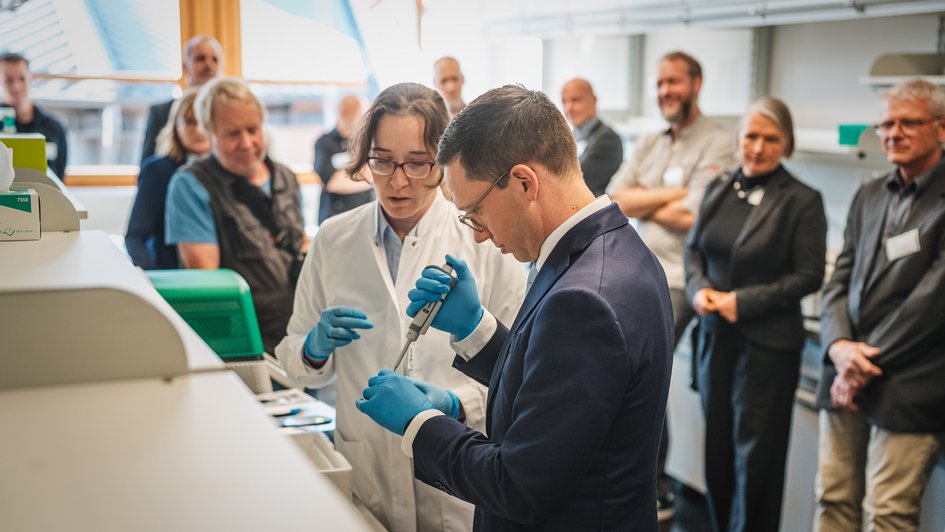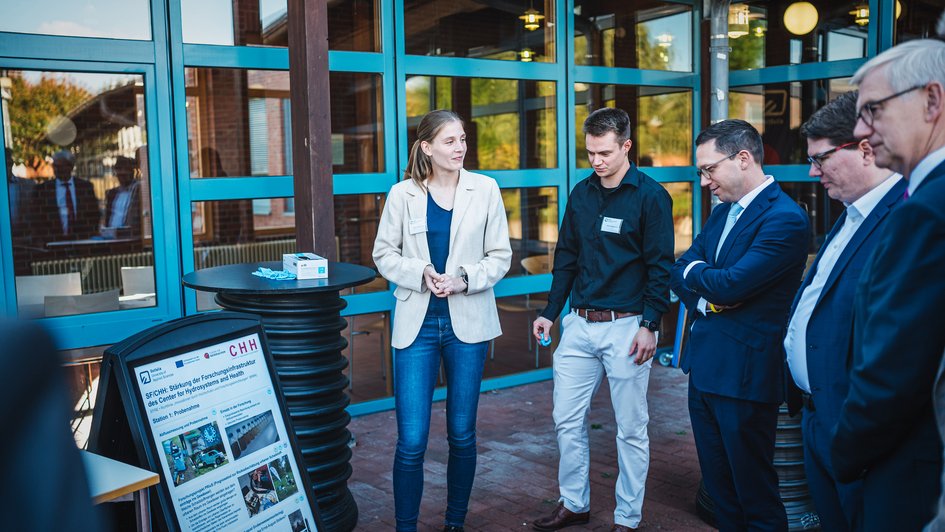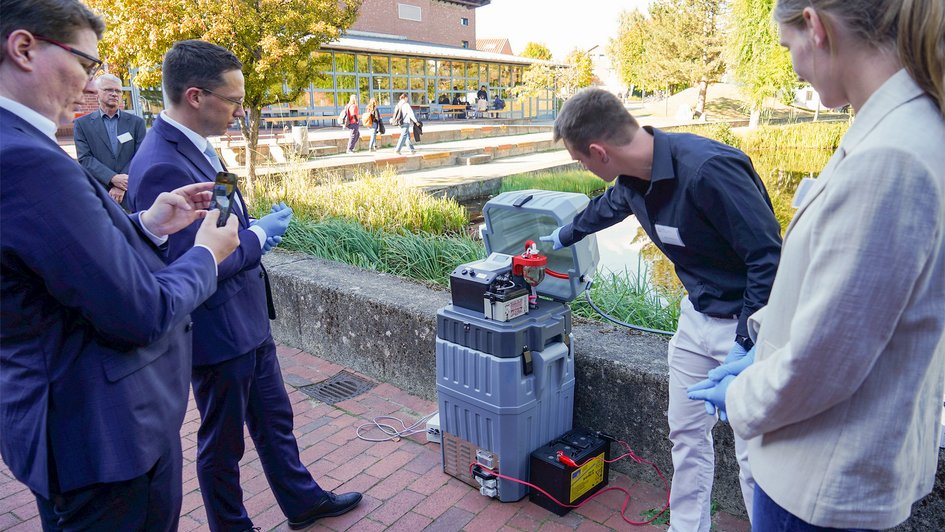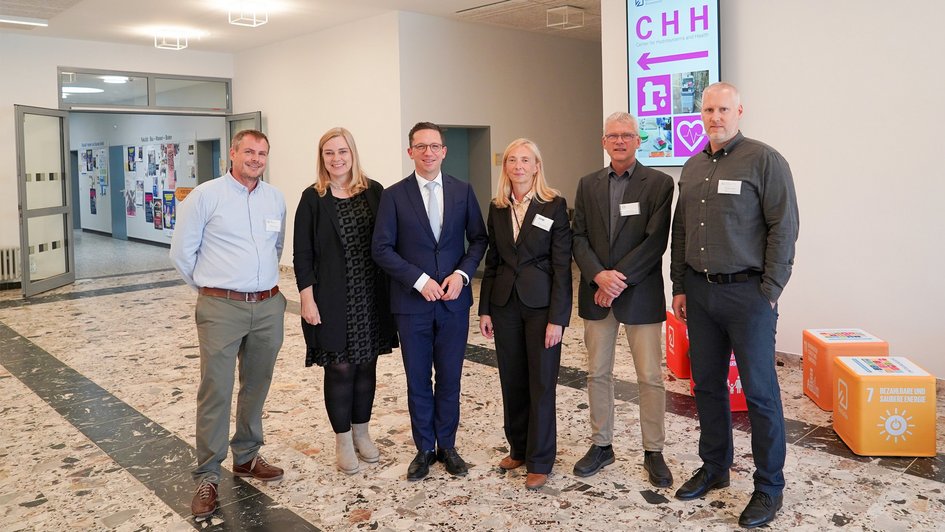What began at the end of 2020 during the coronavirus pandemic with a research project between Ostfalia University and Leibniz University Hannover (LUH) on wastewater monitoring as an early warning system for waves of infection is growing into an innovative centre: the Center for Hydrosystems and Health (CHH) at Ostfalia University's Suderburg campus brings together the departments of water management, computer science, mechanical engineering and healthcare. Researchers from several departments at Ostfalia University, Leibniz Universität Hannover (LUH) and various practice partners are networking here in order to work together on important social challenges relating to the core topic of water.
Lower Saxony's Science Minister Falko Mohrs, who visited the CHH at the Suderburg campus on Monday, 29 September, made it clear how enriching this type of cooperation between universities of applied sciences and universities is for the scientific landscape: "The Center for Hydrosystems and Health is an outstanding example of the strength of interdisciplinary and cross-institutional cooperation in science: it combines excellent basic research and practical expertise, thereby developing innovative, implementable solutions for pressing issues of our time - for the benefit of humans, animals and the environment."
Ostfalia President Prof Dr Julia Siegmüller praised the concept of the CHH on the Suderburg campus, which, with the projects based there, exemplifies how research has a direct impact on and for society: "Researchers from various disciplines come together here to do what is needed: tackling topics with high social relevance in the field of water and environmental research through the mutual transfer of knowledge with stakeholders from the field."
During his visit, Science Minister Mohrs was given a practical insight into the current and planned projects of the research centre, which was founded in 2023 on the initiative of Ostfalia researchers from various disciplines. Seven researchers from Ostfalia and one scientist from LUH are currently permanent members of the CHH team. Together with their teams, they are involved in the monitoring and analysis of water samples and other environmental samples, creating digitalised data bases and, in conjunction with various specialist expertise, attempting to model statements that make challenges in the fields of health, climate and the environment visible and can help to tackle them.
An interdisciplinary team is conducting research here in the field of climate impact and environmental research
How can simple and cost-effective sampling methods help to record water quality quickly and efficiently? How can pathogens, for example, be precisely detected in the sewer network using molecular biological, digital and AI-based methods and how can their sources of entry be traced? These are overarching questions that the CHH is working on together with the necessary experts.
In the "Sewer Detectives" project, for example, water and wastewater samples are analysed for antibiotic-resistant pathogens. Similar to the screening project during the pandemic, the fact that wastewater in urban areas is full of information about the habits and health situation of its population is being utilised here. The project is funded by the zukunft.niedersachsen programme.
The KI-Kanal project, funded by the Federal Ministry of Research, Technology and Space, on the other hand, focuses on the consequences of increased heavy rainfall. Researchers are working on the development of a tool with the aim of minimising the risk of flooding caused by overloaded canals.
"We believe we are well on the way to becoming an important point of contact for decision-makers in Lower Saxony," says CHH Chairman Prof Dr Markus Wallner. As a professor of urban water management, he specialises in (urban) hydrology and urban drainage. Wallner was first honoured for his wide-ranging commitment in 2024 with the Lower Saxony Science Prize.
Next important step in the One Health approach
Wallner knows how important and fruitful interdisciplinary exchange is for research and would like to see even more cross-university expertise at the research centre in the future. He has also been working with LUH scientist Prof Dr Regina Nogueira on various other projects since the coronavirus screening project. She contributes the necessary environmental monitoring perspective and is currently the only permanent member from another university at CHH. "Our environment reflects our actions. If we study the environment carefully, we will find the answers to the most diverse questions of our time."
The CHH researchers see the next step in the One Health approach, which considers the health of humans, animals and the environment to be inseparable, as including the animal factor in the research perspectives. An important milestone on this path is a project application submitted by Ostfalia University of Applied Sciences and Arts together with the University of Veterinary Medicine Hannover (TiHo) Foundation and Leibniz Universität Hannover. Prof Dr Paul Becher from the TiHo explains: "In the project, we are aiming to combine the detection of viral infectious agents in animal samples with the detection of these viruses in various water and environmental samples in order to be able to make statements about the spread of influenza viruses such as H5N1, known as the bird flu virus, as well as other viruses."
Your contact for this topic:
Prof Dr Markus Wallner
Ostfalia University of Applied Sciences
Suderburg Campus, Faculty of Building-Water-Soil
Herbert-Meyer-Str. 7
29556 Suderburg
Phone: +49 (0) 5826 988 61150
E-mail: m.wallner@ostfalia.de




